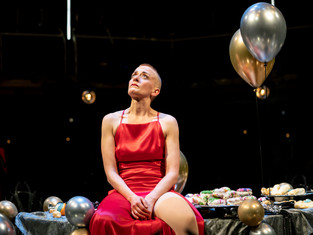Macbeth
- Jeffrey Wainwright

- Sep 19, 2019
- 3 min read
William Shakespeare
Royal Exchange Theatre Company
Royal Exchange Theatre, Manchester
13 September - 19 October 2019; 2hr 45min.


This interesting and exciting production may be the first mixed-gender Macbeth to cast a female in the leading role. That therefore is bound to be prime among its many interests. How convincing is it for Shakespeare's macho warrior and ruthless, serial murderer to be a woman?
At an immediate level, Lucy Ellinson as Macbeth is utterly convincing. She has the swagger and informal carriage of a front-line soldier, contemptuous of the more conventional deportment of the medalled males in their smart greatcoats surrounding her. The passionate kiss with which she first greets Lady Macbeth shows us at once the energy that fuels their relationship.
These are women in thrall to a transgressive, uber version of masculinity: Macbeth to match anything males can do and more, Lady Macbeth – "unsex me here" – determined to deny the most fundamental lineaments of femininity as she speaks of plucking her nipple from her infant's "boneless gums". Their tragedy is that they are goaded too far in this transgression.
A perpetual issue in Macbeth is how much they are the agents of their rise and fall and how far it is determined by fate, in the form of the temptation of the Witches. It is not finally decidable, but the Witches have a very distinctive role here.
Brilliantly played throughout by Bryony Davies, Nicola May-Taylor and Charlotte Merriam, they appear first as ecstatic maenads, mad, bad and dangerous to know. They are also knowing, winking and smirking as though, when they first meet, Macbeth were making a clumsy effort to chat them up.
This knowingness of where all this is going to lead is carried on through director Christopher Haydon's brilliant idea of employing the Witches – now transformed into immaculate servants, but subtly recognisable – in the Macbeth household. They are always there, their mute insolence and sidelong looks suggesting the undermining of the Macbeths.Their mockery might be seen as aimed at the Macbeths' mistaking of their nature, but if so there is a nasty superiority in their glee.
They set the table for the riotous banquet scene – with the appearances of Banquo's ghost that so unseam Macbeth – dressed for once in women's clothes, a scene that concludes with a chilling shriek of anguish from Ony Uhiara's Lady Macbeth as she apprehends the catastrophe to come.
Masculinity, stolid and unspectacular, might seem to come well out this mayhem. Banquo (Theo Ogundipe) is deeply sympathetic, the tiny scene with his son even as he begins to be assaulted by "cursed thoughts" before the murder of Queen Duncan, wonderfully detailed and tender.
Paul Hickey's Macduff, the very model of a well-pressed major-general, is clear and authoritative until we remember he has left his wife and children unprotected from Macbeth's murderous purge. When he learns of this, Malcolm (another model, this time of a subaltern royal by David Hartley), urges him to "dispute it like a man", to which Macduff replies: "I shall do so. But I must also feel it like a man" as he collapses into weeping rage.
Masculinity is seen at its worst in the servile and conscienceless murderers, especially Nima Taleghani's Lennox, and their slaughter of Lady Macduff (an affecting performance from Rachel Denning, who doubles with a characterful Porter) and "all her pretty ones".
This is a thought-provoking production, full of freshly-conceived detail – such as the scene in which Macbeth interviews the candidates for Banquo's murderers while polishing his shoes. Lucy Ellinson goes back and forth in her resolution and at the end, faced with Macduff, is puffed with arrogant self-confidence – until she learns that he is not "of woman-born", and is then utterly deflated before finding some last vestige of the military valour she has fought so hard to cultivate.
If this strong characterisation were matched by clearer diction it would be a superlative performance at the heart of Christopher Haydon's excellently-designed (Oli Townsend) and lit (Colin Grenfell) production. There is sound (Elena Pena) and fury aplenty here, but only in the service of hard-working intelligence.











